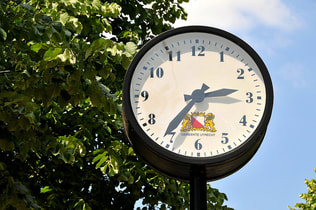 We're at the end of July, in the middle of summer, and finally experiencing pleasant temperatures after a heatwave that lasted nearly a week. Depending on where you live, summertime brings warmer temperatures, but it also brings a change of pace. Kids are out of school; families take vacations; we fire up the grills; we go to the beach and enjoy other outdoor activities; and as for work, some of us work modified schedules--summer hours--in order to make the most of the season. But there's something I've noticed: those of us who make our own schedules--maybe we own our own businesses or are independent contractors--sometimes don't know how to change our pace, even when everything around us is telling us we ought to. While being an entrepreneur comes with its share of challenges, it also comes with many joys and freedoms. Many of us who write our own pay checks, so to speak, have chosen this route because we want a certain degree of control that we don't, otherwise, believe we'd get, like creative control, intellectual control, financial control, and control over time. But what happens, especially when it comes to controlling our time, is that we sometimes find ourselves working more rigorous schedules than we would if we were working as employees for someone else. I completely understand the dynamic in that our income is more directly tied to how much work we do and how many engagements we get, and regardless of the time of year and regardless of how beautiful the weather, our bills don't stop. So, it's easy and, at times, may even be necessary, to fall into a space of "All work, no play," but the reality is that "all work and no play" is no fun, and not only is it no fun, it imprisons us to our work, it smothers our freedom and keeps us in bondage, and on top of that it's simply not healthy and can cause a lot of stress. Yet, these may be the very reasons why we chose a more independent path: we were seeking what we believed would give us more "play" and not "all work"; what would give us more freedom; and what would provide a healthier lifestyle. There's no question that as entrepreneurs, as independents, and even as employees, we're going to have to work hard, but as entrepreneurs and independents, because we, typically, don't have set vacation times or a set number of days that we can use for time off, we have to be all the more conscious about determining our on-seasons, our off-seasons, and when to take a break, and once we decide to take a break, how to smoothly transition into that break or into vacation-mode. I learned this one day a little under ten years ago. My family and I were about to go on a summer vacation. My husband had decided to work from home for just a few hours to wrap things up with work. Our kids were both pumped and restless and just ready to be gone by now. I, on the other hand, on top of making sure we were all packed up and ready to go, on top of trying to keep our kids occupied so that they would not disturb Daddy while he was trying to work, decided to squeeze in a last-minute meeting with a client just before we were scheduled to leave. In theory, this seemed like a good idea. I'd get to take care of things for the client before I left, which meant they wouldn't have to wait until I returned, and I'd also get paid my fee at the end of our meeting, which meant I'd make some money right before I left. But what became the problem? Before the meeting could take place, I had to revise and print a few documents that the client needed to sign, but once I finished the revisions, I now had one problem after another after another with my printer. The documents weren't printing correctly; the clock was ticking; my kids were growing more and more restless; my husband and I were becoming more and more distracted by them; and he and I were becoming more and more annoyed with each other because we each felt like the other was not helping the other one out by keeping the kids occupied. And the more this scenario continued, the more stressed out I became with those documents, with my kids, and with my husband and the more concerned I became that I'd be late or unprepared for the meeting or would maybe have to cancel altogether. And we still had a flight to catch! And I still had to make sure we were fully packed up and ready to go because, remember, I decided to schedule a "last-minute" meeting, so the time I spent preparing for the meeting distracted my time away from finishing up preparing for vacation, and all of this because I was so deeply entrenched in work-mode. But by this point, I no longer felt like going on any vacation. I was stressed, annoyed, and aggravated, and should have never scheduled that meeting in the first place, and after all of that, you wouldn't believe what happened. The client ended up canceling because they had an emergency. I've learned that no matter how much and how hard I work and may need to work to complete certain tasks, accomplish certain goals, and achieve certain objectives, I also have to know when to pump the brakes and slow down, and even stop. Even at times when I physically and mentally want to keep my hand to the plow and keep on working, I've realized that there's a time and season for everything, including a time to be on and a time to be off; a season to be on and a season to be off. Yes, I could force myself to keep working even when my head is really not into it, and sometimes I may need to force myself to keep working when my head is really not into it. But at the same time, there are times when I need to put up the "Closed for Business" sign in my mind, because everything around me says I need to, or, at the very least, I may need to hang the "Out to Lunch" sign up. Perhaps, you've found yourself in similar positions and are not quite sure how to set healthy boundaries around and within your schedule so that you're not constantly "on" and working all of the time. I'll share with you what I do, and maybe this will help. Just as a year is broken up into seasons, I realize that my calendar year has seasons of its own. So, I've accepted the reality that there are certain times throughout the year when I need to turn down my work schedule and times when I need to turn it completely off. So, for example, January is turned down for me--I'm coming off of the Holidays, I'm reflecting on the year ahead, and I'm also setting things up for the months to come. Then, February thru mid- to late-June, my schedule is turned up. But, then, July and August, I turn down and, at times, I turn completely off. In September, after Labor Day, I rev up until the first week of December. And, then, I'm completely off during the last three weeks of the year. This has worked for me, and maybe something like this will work for you, but the key is to have something as opposed to nothing to bring structure and parameters to our schedules to help keep us from constantly working all the time. This way, we know ahead of time when we're on, when we're off; when to turn up, when to turn down; when to work, when to play; and how to truly have the freedom and control over our time that we so desire.
0 Comments
Your comment will be posted after it is approved.
Leave a Reply. |
AuthorLike you, Katrina loves seeing people in healthy relationships (with themselves and others) that they genuinely enjoy and not just simply tolerate. This blog is dedicated to achieving that vision. Archives
April 2018
Categories |
Photos used under Creative Commons from Julie, Dave & Family, Lel4nd, Cjaise, symphony of love, Alex Goldmark, Justin Chan Photography, juliamaudlin, Summer Skyes 11

 RSS Feed
RSS Feed

